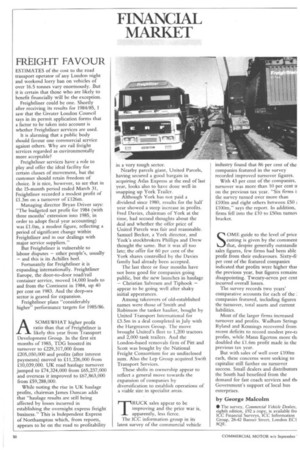FINANCIAL MARKET
Page 52

If you've noticed an error in this article please click here to report it so we can fix it.
FREIGHT FAVOUR
ESTIMATES of the cost to the road transport operator of any London night and weekend lorry ban on vehicles of over 16.5 tonnes vary enormously. But it is certain that those who are likely to benefit financially will be the exception.
Freightliner could be one. Shortly after receiving its results for 1984/85, I saw that the Greater London Council says in its permit application forms that a factor to be taken into account is whether Freightliner services are used.
It is alarming that a public body should favour one commercial service against others. Why are rail freight services regarded as environmentally more acceptable?
Freightliner services have a role to play and offer the ideal facility for certain classes of movement, but the customer should retain freedom of choice. It is nice, however, to see that in the 15-month period ended March 31, Freightliner recorded a modest profit of £1.3m on a turnover of £126m.
Managing director Bryan Driver says: "The budgeted net profit for 1984 (with three months' extension into 1985, in order to adopt fiscal year accounting) was £1.0m, a modest figure, reflecting a period of significant change within Freightliner and in our dealings with major service suppliers."
But Freightliner is vulnerable to labour disputes — other people's, usually — and this is its Achilles heel.
Fortunately for Freightliner it is expanding internationally. Freightliner Europe, the door-to-door road/rail container service, moved 14,000 loads to and from the Continent in 1984, up 40 per cent on 1983. And the deep-sea sector is geared for expansion.
Freightliner plans "considerably higher" performance targets for 1985/86.
ASOMEWHAT higher profit ratio than that of Freightliner is likely this year from Transport Development Group. In the first six months of 1985, TDG boosted its turnover to £229,317,000 from £205,050,000 and profits (after interest payments) moved to £11,226,000 from £10,039,000. UK road haulage turnover jumped to £74,324,000 from £65,237,000 and overseas it improved to £67,863,000 from £59,288,000.
While noting the rise in UK haulage profits, chairman James Duncan adds that "haulage results are still being affected by losses incurred in establishing the overnight express freight business." This is Independent Express of Northampton which, from reports, appears to be on the road to profitability in a very tough sector.
Nearby parcels giant, United Parcels, having secured a good bargain in acquiring Atlas Express at the end of last year, looks also to have done well in snapping up York Trailer.
Although York has not paid a dividend since 1980, results for the half year showed a steep increase in profits. Fred Davies, chairman of York at the time, had second thoughts about the deal and whether the offer price of United Parcels was fair and reasonable. Samuel Becket, a York director, and York's stockbrokers Phillips and Drew thought the same. But it was all too late; the offer for 60 per cent of the York shares controlled by the Davies family had already been accepted.
The last three or four months have not been good for companies going public, but the new launches in haulage — Christian Salvesen and Tiphook — appear to be going well after shaky initial appearances.
Among takeovers of old-established names were those of Smith and Robinson the tanker haulier, bought by United Transport International for 13.5m in a deal completed in July with the Hargreaves Group. The move brought United's fleet to 1,200 tractors and 2,000 tank trailers. And the London-based removals firm of Pitt and Scott was bought by the National Freight Consortium for an undisclosed sum. Also the Lep Group acquired Swift Transport Services.
These shifts in ownership appear to reflect a general move towards the expansion of companies by diversification to establish operations of a viable size in specialist areas.
TRUCK sales appear to be improving and the price war is, apparently, less fierce. The ICC information group in its
latest survey of the commercial vehicle industry found that 86 per cent of the companies featured in the survey recorded improved turnover figures.
With 43 per cent of the companies, turnover was more than 10 per cent u on the previous tax year. "Six firms i. the survey turned over more than £100m and eight others between £50 1100m," says the report. In addition, firms fell into the £10 to £50m tumor bracket.
SOME guide to the level of price cutting is given by the comment that, despite generally outstandir sales figures, few firms had been able profit from their endeavours. Sixty-fl per cent of the featured companies indicated that profits were higher thar the previous year, but figures remaint disappointing. Twenty-seven per cent incurred overall losses.
The survey records two years' comparative accounts for each of the : companies featured, including figures the turnover, total assets and current liabilities.
Most of the larger firms increased turnover and profits. Wadham Stringt Ryland and Kennings recovered from recent deficits to record modest pre-ta profits, while Mann Egerton more th; doubled the £1.6m profit made in the previous tax year.
But with sales of well over £100m each, these concerns were seeking to capitalise still further on turnover success. Small dealers and distributors the South had benefited from the demand for fast coach services and tht Government's support of local bus enterprises,
by George Malcolm • The survey, Commercial Vehicle Dealers, eighth edition, £92 a copy, is available fro ICC Financial Surveys, -ICC Information Group, 28-42 Banner Street, London EC1 8QE.




































































































